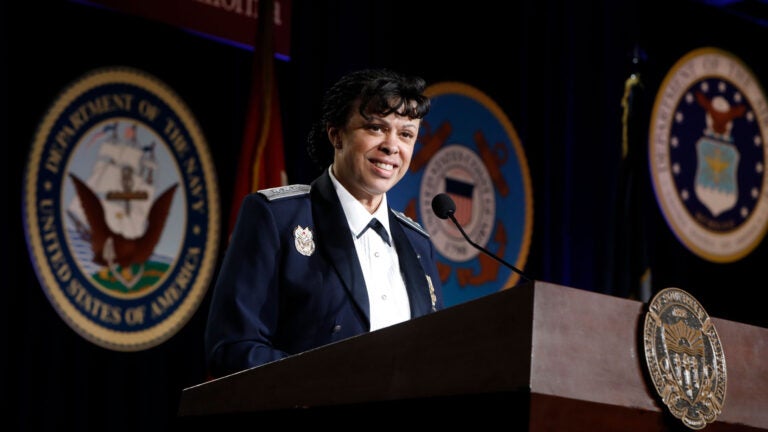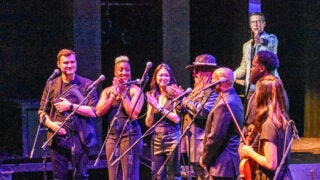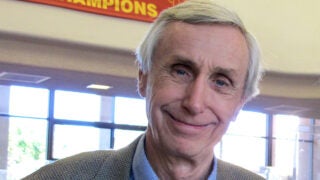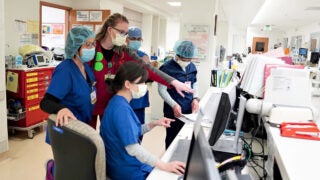
Lt. Gen. Stayce Harris gives the keynote speech at the ninth annual USC Veterans and ROTC Gala. (USC Photo/Steve Cohn)
Trailblazing Trojan touts strength at ninth annual USC Veterans and ROTC Gala
Stayce Harris, the first female African-American to earn the rank of lieutenant general in U.S. Air Force, inspires military with keynote speech
Alumna Lt. Gen. Stayce Harris, the first female African-American to achieve the rank of lieutenant general in the U.S. Air Force, emphasized the value of technologic innovation in a speech at USC’s annual celebration for the military.
Harris, currently Air Force inspector general, was the guest of honor at the ninth annual USC Veterans and ROTC Gala on March 20 in downtown Los Angeles.
The USC Viterbi School of Engineering graduate was drawn to the school because of its leadership in research, and she noted the significance of innovation to national defense.
“We have to draw from the best. We have to identify research for its potential to help national security and incorporate it into our armed forces,” Harris told an audience of about 800. “The advantage will go to those who create the best technologies and who integrate them in ways that provide military strength.”
A night of traditions
The university organizes the event to recognize hundreds of USC veterans and their spouses and ROTC cadets and their officers. The gala, which goes back almost a decade, includes rituals that range from a march to a cake to a somber remembrance of the fallen.
USC President C. L. Max Nikias welcomed veterans of World War II and the Korean War, along with a group of Tuskegee Airmen, to the gala.
“We live in an America born on a mighty dream of freedom, an America for which we are ready to lay down our lives,” Nikias said. “Our USC veterans are part of a long line of brave warriors who answered that noble call. And now we have a chance to show our gratitude in a very real way.”
Nikias noted the USC-ROTC partnership, which has endured for more than a century. Today, 158 ROTC students are enrolled at the university. Thirty-five of those students are women.
The mission is the goal
Harris achieved the rank of lieutenant general in 2016. Throughout her career, she has downplayed struggles and focused on purpose.
For me, breaking barriers was never the intention.
Stayce Harris
“For me, breaking barriers was never the intention,” Harris said in an interview before the event. “The goal has always been the mission. I wanted to be the best engineer I could be. Then I went to pilot training. I didn’t ask how many women were there. I didn’t know if there were women of color who had preceded me because that didn’t really matter. I needed to become the best pilot I could become.”
Born to be a Trojan
Harris was born in Los Angeles, and spent the first few years of her life a few blocks from USC at her family home on Santa Barbara Avenue (later renamed Martin Luther King Boulevard).
“Maybe when I was walking around the neighborhood, the Coliseum was planted in my memory to lead me back to USC,” Harris said. “When I told my parents I was accepted, they almost cried. I still feel part of the Trojan Family.”
Harris, who credits the ROTC for giving her the leadership and life skills critical to her success, went on to an Air Force career now in its fourth decade. That career has included 2,500 hours of flight time in military aircraft. Harris commanded more than 15,000 citizen airmen at Dobbins Air Reserve Base in Georgia and captained 747s as a commercial airline pilot when not on active duty.
As inspector general, Harris reports to the secretary and chief of staff of the Air Force on matters involving efficiency and readiness, as well as investigating fraud and abuse.
Unleashing innovation
Harris looked to the past and to the future during her address, citing visionary generals Ira Eaker and Henry Arnold.
“They knew they would have to break glass to unleash innovation,” Harris said. “They understood the future depends on scientific research, which must be deployed quickly to support air power.”
Many in the audience were USC veterans on active duty in recent years. Harris noted that most college students have lived during a long period of ongoing active combat operations.
“We’ve spent 28 years in combat. Technology will change the character of war as it did for our predecessors. That requires us to innovate boldly,” she said. “We are all innovators and when we release that part of ourselves, we become a more effective fighting force. Be bold, innovate and fight on.”



